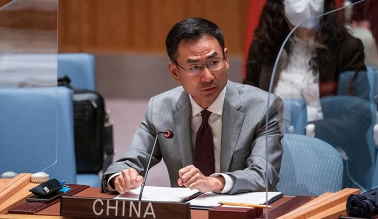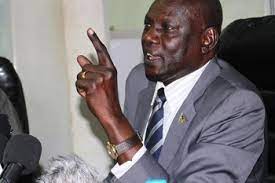
Explanation of Vote by Ambassador Geng Shuang on the UN Security Council Resolution on South Sudan

Madam President,
China abstained from voting on the draft resolution on which the Council just voted. I would like to make the following explanation.
For quite some time, the sanctions imposed by the Security Council have seriously hampered South Sudan’s implementation of the revitalized agreement and its efforts to enhance security capabilities, develop economic and trade ties, and carry out humanitarian operations, and have been subject to much controversy. In light of this, China has consistently held a cautious attitude toward maintaining the said sanctions, and has on multiple occasions abstained from voting on the resolutions extending the sanctions.
The lifting of sanctions concerns South Sudan’s long-term peace, stability and people’s wellbeing, and it is also the common aspiration of countries in the region. IGAD, at its meeting in November last year, and the AUPSC, at its meeting this past February, adopted communiques respectively, calling for the lifting of the unreasonable arms embargo and other sanctions against South Sudan.
Regrettably, the penholder ignored the positive progress that South Sudan had registered on multiple fronts against the sanctions benchmarks, and disregarded the just cause of the countries concerned and the international community. Instead of lifting sanctions, the penholder included more items in the embargo list of the early draft of the revolution, added criteria for listing, and leveled accusations and put pressures on the South Sudanese authorities. Such practices are unacceptable.
During the consultations, A3 members of the Council proposed to formulate a list of exemptions from arms embargo. This could have been a compromised solution to bridge the divide. However, the penholder stubbornly insisted on its own national position, and directly put the draft resolution to a vote without fully discussing A3’s proposal. This approach is not constructive at all, and undermines the unity of the Security Council. China expresses its rejection.
Madam President,
China has always believed that the Security Council should handle the issue of sanctions in a prudent and responsible manner, carefully calibrate the intensity and scope of sanctions, and stay committed to creating favorable conditions for political settlement. Electoral organization, financial management, and exploitation of natural resources should have been decided by the South Sudanese Government and people. However, the draft resolution that was put to a vote just now includes the so-called obstruction of free and fair elections into the listing criteria and also interferes with South Sudan’s affairs on issues such as finance, anti-corruption and resource management. The international community should take an objective view of the difficulties and challenges South Sudan faces in improving its national governance and give the country the necessary patience and encouragement. No country should use Security Council sanctions as a political tool for exerting diplomatic pressure and coercion to undermine the sovereignty and security of other countries.
Madam President,
China has repeatedly stressed that the pen-holder should maintain objectivity and impartiality, listen to the legitimate concerns and appeals of the countries concerned, and maintain the unity and cooperation of the Council to the greatest extent possible. Recently, some pen-holders have disregarded the views of the countries concerned and other members of the Security Council, put their national positions above the collective views, and engaged in double standards and political manipulation. The frequent occurrence of such events warrants the Council’s attention and alert.
Thank you, Madam President.




































